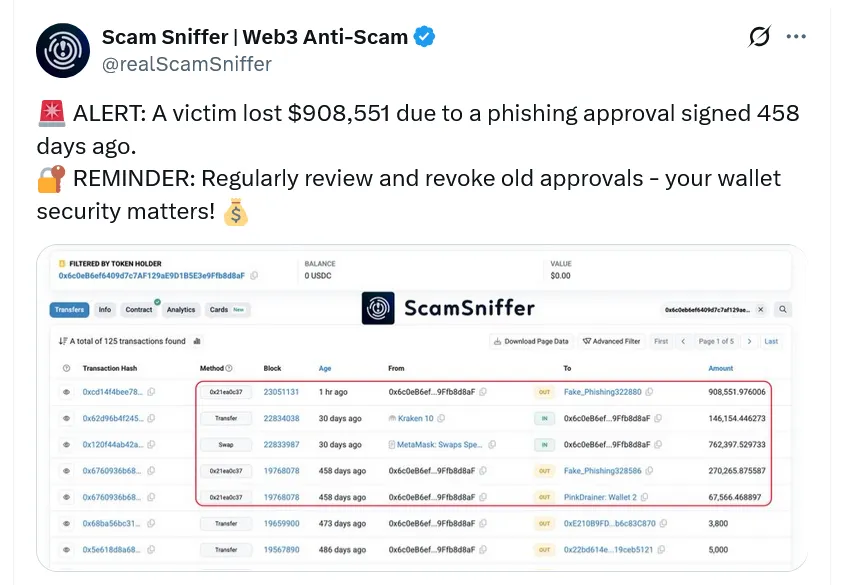🚨 $908K Lost in Delayed Crypto Phishing Attack — Here’s How to Protect Yourself
-

A crypto investor just lost $908,551 in a sophisticated phishing scam — 15 months after unknowingly giving a scammer access to their wallet.The attack, revealed by Scam Sniffer, is a chilling reminder that a single malicious transaction can haunt you long after it’s signed.
 What happened?
What happened?Back in April 2024, the victim likely interacted with a fake airdrop or phishing site and signed an ERC-20 token approval—a seemingly harmless transaction that silently granted the scammer’s address ongoing access to their wallet.
Fast-forward 458 days later:
On July 2, the victim deposited $762K into the compromised wallet. Ten minutes later, another $146K arrived from Kraken. The attacker patiently waited… Then struck on August 2, draining the full balance in USDC.All it took was one old approval. And a lot of patience.
 What is a phishing approval?
What is a phishing approval?Unlike traditional phishing where you give away your seed phrase, this type of attack tricks you into signing a permission (called an "approval") that lets the attacker spend your tokens anytime in the future — no need for a hack or brute force.
The scary part? You might not notice it happened.
 ️ How to protect your funds:
️ How to protect your funds:✅ Regularly revoke token approvals using tools like: Etherscan’s Token Approval Checker Revoke.cash 🔍 Double-check every signature — especially when interacting with unknown dApps or airdrops. 🔒 Avoid signing blind transactions (especially “SetApprovalForAll”). 📉 Keep large funds in cold storage — never in a wallet with unknown permissions. “Your wallet security matters,” says Scam Sniffer. And this case proves it. Lesson: Phishing attacks aren’t always fast and flashy. Some of the most damaging ones are silent, slow, and completely legal—until it’s too late.
Lesson: Phishing attacks aren’t always fast and flashy. Some of the most damaging ones are silent, slow, and completely legal—until it’s too late.Take 5 minutes today to check your approvals. It could save your portfolio tomorrow.
-
Absolutely alarming — $908K lost in a delayed phishing attack is a brutal reminder that threats in crypto aren't always immediate. The sophistication of these scams is increasing fast. It's not just clicking a bad link anymore — attackers are embedding malware, hijacking sessions, and even waiting weeks to strike.
This case highlights how crucial it is to use hardware wallets, regularly revoke token approvals, and double-check every single interaction with your wallet. No matter how experienced we think we are, one small lapse can cost everything.
Thanks for bringing attention to this — more people need to treat their wallet security as seriously as they treat their portfolio strategy.
 ️
️

















